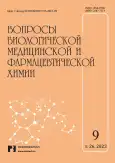The influence of aeroponics on the adaptation of Mentha piperita L. and Melissa officinalis L. microclones and accumulation of phenolic compounds
- Authors: Gushchin A.V.1, Kirakosyan R.N.1, Cherednichenko M.Y.1, Kalashnikova E.A.1
-
Affiliations:
- Russian State Agrarian University – Moscow Agricultural Academy named after K.A. Timiryazeva
- Issue: Vol 26, No 9 (2023)
- Pages: 52-59
- Section: Plant protection and biotechnology
- URL: https://bakhtiniada.ru/1560-9596/article/view/143140
- DOI: https://doi.org/10.29296/25877313-2023-09-08
- ID: 143140
Cite item
Abstract
Relevance. One of the time-consuming stages on which the success of clonal micropropagation depends is the transfer of microclones from in vitro conditions to ex vitro conditions. At this stage, plants experience stress, which leads to their death. In addition, the low survival rate of plants to ex vitro conditions is primarily due to their poorly developed root system, non-functional stomatal apparatus, poorly formed cuticle, as well as the use of non-sterile soil. The effectiveness of clonal micropropagation depends on the choice of the nutrient substrate and the technology of adaptation of microclones to ex vitro conditions. Hydroponic and aeroponic technologies are designed to increase the productivity and economic efficiency of clonal micro-propagation of plants, by reducing the time of cultivation of cloned plants.
Purpose of the study. The aim of the study was to study the effect of aeroponics on the growth and accumulation of phenolic compounds in the microclones of medicinal plants Mentha piperita L. and Melissa officinalis L.
Material and methods. The object of the study was the microclones Mentha piperita L. and Melissa officinalis L., which were originally propagated on a hormone-free nutrient medium containing mineral salts according to Murashige and Skооg (MS). Microclones were adapted to ex vitro conditions in two ways: on an aeroponic installation and directly in the soil. Adaptation was carried out on two groups of plants: 1 – with roots, 2 – without roots (the root system was removed with a scalpel before planting on an aeroponic installation or in the soil). The results were taken into account at the end of the adaptation cycle, while taking into account the length of the root system (cm) and the height of plants (cm). Based on the results obtained, the growth index (I) and the specific growth rate (µ) were calculated, and the total content of phenolic compounds and flavonoids was determined.
Results. It is established that at the last stage of clonal micropropagation, it is advisable to use aeroponic installations that allow rooting and adaptation of microclones simultaneously. The developed method makes it possible to obtain high-quality planting material, since this reduces the percentage of plant death, increases the growth and development of green biomass, as well as the root system. The rooting of micro-shoots during adaptation is achieved by including in the composition of the nutrient solution of IBА at a concentration of 0.5 mg / l. In addition, under these conditions, there is a change in phenolic metabolism, which manifests itself in an increase in the total content of phenolic compounds in microclones.
Keywords
Full Text
##article.viewOnOriginalSite##About the authors
A. V. Gushchin
Russian State Agrarian University – Moscow Agricultural Academy named after K.A. Timiryazeva
Author for correspondence.
Email: temagushchin@yandex.ru
Assistant of the Department of Biotechnology
Russian Federation, MoscowR. N. Kirakosyan
Russian State Agrarian University – Moscow Agricultural Academy named after K.A. Timiryazeva
Email: mia41291@mail.ru
Candidate of Biological Sciences, Associate Professor, Department of Biotechnology
Russian Federation, MoscowM. Y. Cherednichenko
Russian State Agrarian University – Moscow Agricultural Academy named after K.A. Timiryazeva
Email: cherednichenko@rgau-msha.ru
Candidate of Biological Sciences, Associate Professor, Acting Head of Department of Biotechnology
Russian Federation, MoscowE. A. Kalashnikova
Russian State Agrarian University – Moscow Agricultural Academy named after K.A. Timiryazeva
Email: kalash0407@mail.ru
Doctor of Biological Sciences, Professor, Department of Biotechnology
Russian Federation, MoscowReferences
- Kalashnikova E.A., Kirakosjan R.N. Kul'tura tkanej i kletok rastenij: uchebnoe posobie. M.: KnoRus. 2023. 184 s.
- Agrobiotehnologii XXI veka. Monografija. Pod red. Belopuhova S.L. 2022. 516 s.
- Kalashnikova E.A., Ganaeva D.R., Desiaterik A.A., Kirakosian R.N., Gushchin A.V. Innovative technologies for cloned plants adaptation. Caspian Journal of Environmental Sciences. 2021; 19(5): 877–882.
- Demenko V.I., Lebedev V.A. Adaptacija rasteniĭ, poluchennyh in vitro, k nesteril'nym uslovijam. Izvestija TSHA. 2011; 1: 60–70.
- Ivanova-Hanina L.V. Adaptacija rastenij-regenerantov ezheviki k uslovijam ex vitro. Uchenye zapiski Krymskogo federal'nogo universiteta imeni V.I. Vernadskogo. Biologija. Himija. 2019; 5(71), 1: 30–39.
- Golovina L.A., Ishmuratova M.M. Optimizacija uslovij adaptacii rastenij-regenerantov smorodiny chernoj (Ribes nigrum L.) sortov bashkirskoj selekcii pri perevode iz in vitro v ex vitro. Izvestija Ufimskogo nauchnogo centra RAN. 2019; 1: 83–88.
- Klyuchka E., Petkovic M. Vertical Greenhouses Agrotechnology: Solution Toward Environmental Problems. Ecological Intensification of Natural Resources for Sustainable Agriculture, 2021: 289–339.
- Ali Lakhiar I., Gao J., Naz Syed T., et al. Modern plant cultivation technologies in agriculture under controlled environment: a review on aeroponics. Journal of Plant Interactions. 2018: 338–352.
- Murashige T., Skoog F. A revised medium for rapid growth and bioassays with tobacco tissue cultures. Physiol. Plant. 1962, 15: 473–497.
- Kalashnikova E.A., Cherednichenko M.Ju., Kirakosjan R.N. i dr. Osnovy biotehnologii. Praktikum. M.: KnoRus, 2023. 160 s.
- Zaprometov M.N. Fenol'nye soedinenija i ih rol' v zhizni rastenija. LVI Timirjazevskie chtenija. M.: Nauka. 1996. 45 s.
- Lakin G.F. Biometrija: ucheb. posobie dlja biol. spec. vuzov. M.: Vysshaja shkola. 1990. 352 s.
- Benabdallah A., Rahmoune C., Boumendjel M., et al. Total phenolic content and antioxidant activity of six wild Mentha species (Lamiaceae) from northeast of Algeria. Asian Pacific Journal of Tropical Biomedicine. 2016; 6(9): 760–766.
- Kumari R., Kumar R. Aeroponics: A Review on Modern. Agriculture Technology. 2019: 286–292.
Supplementary files











